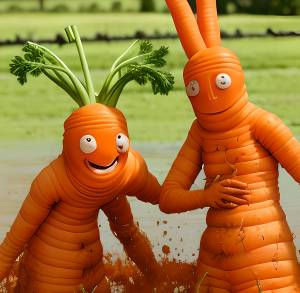- Bombshell Announcement: Pete The Rock announces his candidacy for the President of the United States.
- Bombshell Announcement: Pete The Rock announces his candidacy for the President of the United States.
- Bombshell Announcement: Pete The Rock announces his candidacy for the President of the United States.

Scientists Unveil Surprising Truth: Carrots Are More Orange Than Oranges
July 26, 2024 - In a revelation that has stunned both the culinary world and casual observers alike, scientists have explained why the humble carrot boasts a more vibrant orange hue than the very fruit from which its color takes its name: the orange.
For years, the color of the carrot has been a topic of curiosity. The striking, deep orange of this common vegetable has led many to wonder how it compares to the orange of an actual orange fruit. A team of researchers from the Institute of Color Science (ICS) has finally provided clarity on this colorful conundrum. Dr. Emily Hughes, the lead scientist of the study, explained that the primary reason for the difference lies in the chemical composition and structure of the pigments found in both foods. "Carrots and oranges contain different types of carotenoids-pigments that give them their distinctive colors," Hughes said. "While both are rich in carotenoids, the specific types and concentrations vary significantly."

Carrots are rich in beta-carotene, a type of carotenoid that the human body converts into vitamin A. This pigment is known for its intense orange color, and it is the primary reason why carrots appear so vividly orange. In contrast, oranges contain a mix of carotenoids including beta-cryptoxanthin and lutein, which contribute to a lighter, less intense hue compared to the beta-carotene in carrots. Dr. Hughes elaborated, "Beta-carotene has a much stronger color saturation compared to the other carotenoids. This is why carrots, which are predominantly composed of beta-carotene, look more orange than oranges, which have a blend of different carotenoids resulting in a more subdued color."
The study also noted that the perception of color can be influenced by the context in which it is seen. "Lighting conditions, ripeness, and even the variety of the carrot or orange can affect how orange each appears," Hughes added. The findings have sparked a renewed interest in the science of food color. "Understanding why carrots are more orange than oranges can help us in various fields, from agriculture to food marketing," said Dr. Hughes. "It also highlights the fascinating ways in which nature's pigments influence our daily lives."
Understanding why carrots are more orange than oranges can help us in various fields, from agriculture to food marketing.
The study, published in the latest issue of Journal of Food Chemistry, is already generating buzz among food enthusiasts and scientists alike. As for the rest of us, the next time we reach for a carrot, we might just pause to appreciate its extraordinary, vibrant hue, and the science that makes it so.
Carrots Are More Orange Than Oranges
This story was created using a language model called ChatGPT developed by OpenAI. ChatGPT is a state-of-the-art artificial intelligence trained on a diverse range of texts from books, articles, and websites to generate human-like text based on the prompts it receives.

0 Comments